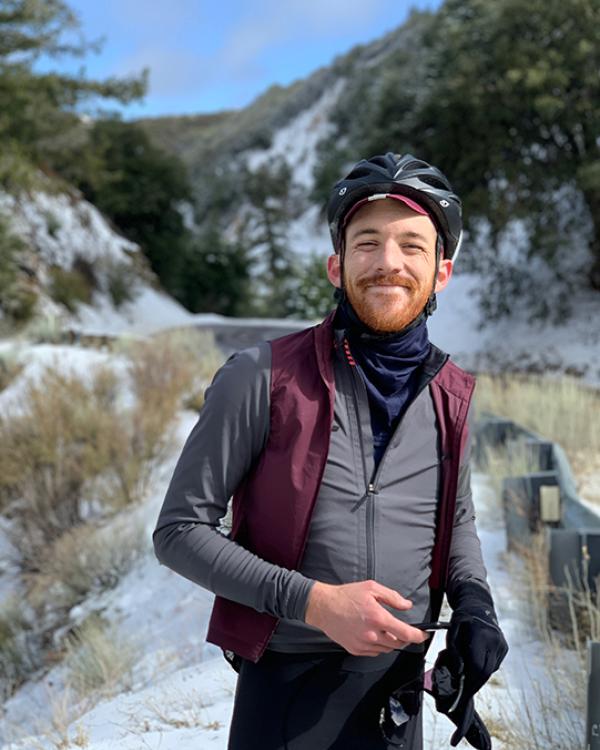
This week we caught up with Matthew Bennett, a first-year PhD student in Science and Math Education in the Department of Education, but his specific interests are in science education in high school settings and teacher education. His advisor is Dr. Danielle Harlow. Prior to starting at GGSE, Matthew taught high school science (mostly physics) for five years, which is why his research interests are geared towards high school settings. Currently, he's interested in exploring student tendencies to compartmentalize information taught in different classes and how to enable teachers to better facilitate student connection-making between different topics/concepts, such as applications of math concepts in science contexts.
GGSE: You came to UCSB after teaching high school science for five years. What made you want to get a PhD?
Bennett: While I was a teacher, I found a few recurring "problems" with the knowledge or thinking patterns that students were able or not able to demonstrate. For example, frequently, my students would be quite capable of solving algebraic equations in their math classes, but as soon as they got to my physics class it was as if they had forgotten how to solve those same forms of equations. It confused me. When I spoke with other teachers about it, I found this wasn't a particularly novel problem, but nobody had any tangible solutions for how to help students do this other than "you have to make it explicit for them." Needless to say, that didn't satisfy. While this was not the only reason, it was certainly a catalyst to actually pursue a PhD.
GGSE: One of your research areas is how to enable teachers to better facilitate student connection-making between different topics/concepts. Can you give an example of how this can be done and say why it's important?
Bennett: I think connection-making is important because, to me, it's a thinking pattern that can help people on a daily, non-academic level. For one example, I have some friends who are carpenters, and they regularly use mathematical and algebraic concepts in their work (believe it or not, some even use trigonometry). In most classrooms this sense of using course content and content-specific skills in a non-academic field isn't really present. This is what I mean by compartmentalization of information.
I'm not entirely sure how teachers can better enable connection-making, but I'm not 100% convinced that connection-making isn't more of a learned skill than some sort of latent cognitive ability. I also think it goes beyond "real world examples." That said, despite my earlier frustration with this response, I do think teachers making connections explicit for students can be an effective short-term way to enable connection-making. But what would be more exciting to me would be if teachers could help students to develop connection-making as a sort of habit of mind—a thinking pattern where students begin to seek out connections across and within disciplines as a part of the learning process, not just when explicitly prompted or presented with such connections.
GGSE: Given you study teacher education, and went through a teacher education program, are there changes you'd like to see made to the process/procedure?
Bennett: I don't know what every teacher ed program is like, but I would love to see some changes. I'll just give two, but (on brand for a teacher) I could talk about this at length. First, I'd love to see teacher ed programs become less compartmentalized (just like I'd love to see K12 classrooms become less compartmentalized). My teacher ed program often felt like it emphasized content over skill acquisition and practice. As a result, I felt that what I was supposed to be learning was only somehow vaguely related to my daily teaching practice. Second, I'd love to see more "why" in teacher ed programs. The extent of connection-making in my teacher ed program typically stopped at "how can you apply this in your classroom?" But some of the most impactful discussions came with on-site mentors who would ask me why I wanted to make a particular pedagogical decision rather than just help me go through the motions that would check the appropriate boxes. Since I had been teaching for two years before I started a teacher ed program, this was the pattern of discussion in my development as a teacher. As a result, I felt disappointed that when I started my teacher ed program and found it so content-oriented, lacking space for us to regularly have meaningful discussions about the various why's in teaching and learning.
GGSE: Assuming you have any free time, what do you like to do with it?
Bennett: I love free time! I typically spend it cycling or golfing, either with friends or by myself. I also frequently post up at Handlebar Coffee and read, do some crosswords, or play a quick game of cards with a friend. Occasionally you might even spot me trying to find a sweet yard sale or two.